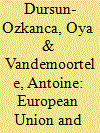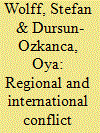|
|
|
Sort Order |
|
|
|
Items / Page
|
|
|
|
|
|
|
| Srl | Item |
| 1 |
ID:
112767


|
|
|
|
|
| Publication |
2012.
|
| Summary/Abstract |
This article presents an introduction to the special volume, titled The European Union (EU) and the Security Sector Reform Practices: Challenges of Implementation, by framing the debate on the EU's Security Sector Reform (SSR) activities in a variety of conflict and post-conflict settings. Drawing on the existing body of literature on SSR, the analytical model proposed here allows us to identify, categorize, and group a wide range of factors that are relevant for understanding the performance of the EU as an SSR actor. This article introduces the main themes of this special issue, summarizes each individual contribution briefly, extends the main research findings of this special issue, and concludes with broad commonalities across different cases. It is a conceptual article outlining a discussion of wider theoretical reflections based on the empirical contributions presented in this volume, and provides an explanatory framework for success or failure in the individual case studies that follow.
|
|
|
|
|
|
|
|
|
|
|
|
|
|
|
|
| 2 |
ID:
114737


|
|
|
|
|
| Publication |
2012.
|
| Summary/Abstract |
There is considerable case-specific and anecdotal evidence of the impact of international organisations in conflict regulation, but conceptual frameworks and systematic comparative research are lacking. We begin by categorising different strategies of regional and international conflict regulation and then offer one possible macro-framework to account for its success or failure. This framework combines a focus on factors internal to the relevant organisation (i.e. its capabilities to act, fund and coordinate and cooperate) with an analysis of the conflict context (at the local, state, regional and global level). We find six factors to be particularly important: availability of resources and willingness to deploy them to strategic effect, commonality of interest among member states or a lead nation/s, long-term and continuously sustained conflict regulation efforts rather than ad hoc/on and off crisis management, effective external cooperation with major partners, a permissive conflict context and local interest in ending rather than continuing the conflict.
|
|
|
|
|
|
|
|
|
|
|
|
|
|
|
|
| 3 |
ID:
112772


|
|
|
|
|
| Publication |
2012.
|
| Summary/Abstract |
Security Sector Reform (SSR) is critical in post-conflict settings, particularly when it comes to the reform of judicial systems, intelligence services, police, correctional systems, and the military. This article traces and analyzes the inter-institutional division of labor between the European Union (EU), the Organization for Security and Cooperation in Europe (OSCE) Mission in Kosovo, and the United Nations Interim Administration Mission in Kosovo (UNMIK) concerning police reform process in Kosovo. After providing an overview of the evolution of cooperation on SSR between the EU and these other international organizations in Kosovo, the article outlines the complex division of labor among various international organizations in establishing the police force, discusses the process of recruiting minorities into the force, and analyzes the general process of reforming Kosovo's police force. Following a discussion of the obstacles and challenges associated with building and reforming the police, it concludes with a summary of key findings.
|
|
|
|
|
|
|
|
|
|
|
|
|
|
|
|
|
|
|
|
|